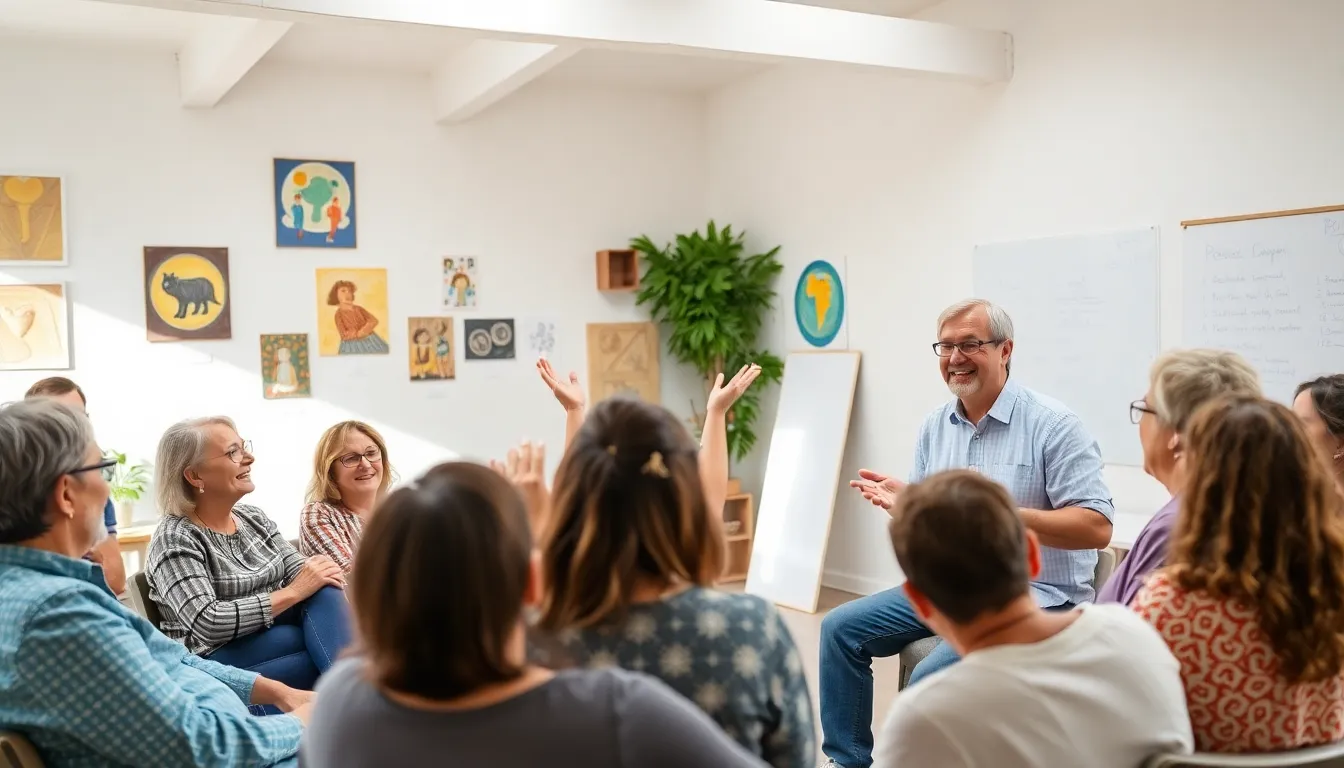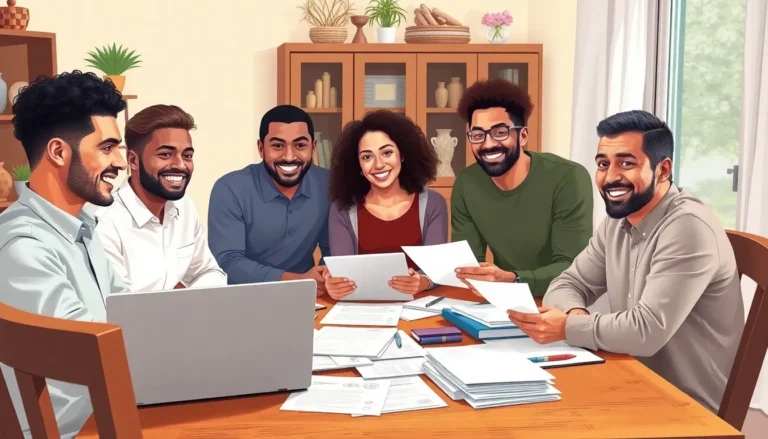In a world overflowing with information, the art of storytelling shines brighter than ever. Whether it’s captivating an audience or simply sharing a personal experience, storytelling is the secret sauce that transforms mundane moments into unforgettable tales. Imagine walking into a room filled with eager faces, all hanging on your every word. Sounds magical, right?
Table of Contents
ToggleWhat Is a Storytelling Workshop?
A storytelling workshop serves as a dedicated space for individuals to explore the art and craft of telling stories. Participants often learn techniques to enhance their storytelling abilities, allowing them to engage audiences effectively. Training occurs through various interactive activities, including exercises that stimulate creativity and develop narrative structures.
Workshops typically cover key elements of storytelling. These elements may include character development, plot construction, and the use of sensory details. Attendees gain insights into their unique storytelling styles, enabling personal expression and authenticity.
Facilitators, often experienced storytellers themselves, provide guidance and feedback throughout the process. Real-time critiques help participants refine their narratives, making skills more applicable in diverse settings. The group setting encourages sharing and collaboration, fostering a supportive environment.
Participants in storytelling workshops may pursue different goals. Some seek professional development, wanting to enhance presentation skills in a corporate setting. Others might aim to improve personal storytelling for social situations or even family gatherings.
In addition to these benefits, workshops often create lasting connections among attendees. Networking opportunities may arise, leading to potential collaborations. Engaging everyone in storytelling creates a bond that extends beyond the workshop itself.
Ultimately, a storytelling workshop equips individuals with valuable skills and confidence to share their stories. The blend of creativity, collaboration, and feedback transforms ordinary narratives into compelling tales that resonate with audiences.
Benefits of Attending a Storytelling Workshop


Storytelling workshops offer numerous advantages for participants, ranging from improved communication abilities to enhanced creativity.
Enhancing Communication Skills
Effective communication is crucial in various personal and professional settings. Participants in storytelling workshops develop their ability to articulate thoughts and feelings clearly. Skillful facilitators guide individuals through exercises that focus on clarity, conciseness, and engagement. Practicing storytelling techniques fosters active listening, which heightens awareness of audience reactions. This feedback helps storytellers adapt their narratives for better connection. Furthermore, participants learn to convey complex ideas in relatable ways, making their messages more impactful.
Boosting Creativity
Creativity flourishes in storytelling workshops as individuals explore diverse narrative forms. Different genres and styles prompt participants to push boundaries and expand their imaginative capabilities. Engaging in collaborative exercises encourages innovative thinking, as sharing ideas sparks inspiration. Participants may experiment with unexpected plot twists, unique character arcs, and vivid sensory details. This environment nurtures original thought, empowering storytellers to develop distinct voices. Ultimately, the creative skills attained during these workshops enrich both personal expression and professional storytelling ventures.
Key Elements of a Successful Storytelling Workshop
Successful storytelling workshops incorporate several essential elements that enhance participant experiences and outcomes. Engaging activities and effective feedback form the backbone of a productive learning environment.
Engaging Activities
Interactive exercises captivate participants, allowing them to practice storytelling techniques in real-time. Group activities foster collaboration and spark creativity among attendees. Collaborative storytelling challenges encourage individuals to weave their narratives while embracing peer ideas. Role-playing scenarios also immerse participants in various character perspectives, deepening their understanding of character development. Using props and visuals adds an additional layer of excitement, making sessions more memorable. Each of these engaging activities cultivates a thrilling atmosphere where participants confidently explore their storytelling abilities.
Feedback and Improvement
Real-time feedback accelerates participants’ growth, promoting continuous improvement. Observing facilitators provide constructive insights on strengths and areas for growth, shaping individual storytelling styles. Encouraging group critiques fosters community learning, as participants share diverse perspectives on each other’s stories. Valuable feedback from peers also empowers attendees to refine their narratives before sharing them publicly. Implementing these feedback loops creates an atmosphere of trust and growth, motivating participants to take risks and expand their storytelling capabilities. Everyone benefits from this collaborative approach, strengthening the overall workshop experience.
How to Choose the Right Storytelling Workshop
Finding the right storytelling workshop involves careful consideration of several factors. Participants should prioritize understanding both the credentials of the facilitators and the course content.
Assessing Credentials
Evaluating the credentials of facilitators helps ensure a quality learning experience. Look for professionals with experience in storytelling, teaching, or related fields. Check their backgrounds for proven success in engaging audiences and crafting compelling narratives. Previous participants’ testimonials can also provide insight into the facilitators’ effectiveness and teaching style. Choose workshops led by recognized authors, experienced speakers, or industry experts. Their expertise can significantly enhance the learning environment, making the workshop more valuable.
Understanding Course Content
Grasping the course content is essential for selecting a suitable workshop. Review the syllabus or outline to see key topics covered, such as character development or plot construction. Workshops should emphasize both theory and practical exercises, allowing participants to practice skills actively. Consider sessions that focus on real-world application, as well as individual storytelling style exploration. Interactive components, like group storytelling and feedback sessions, greatly enhance learning. Be sure to evaluate the balance between structured learning and creative exploration to ensure a fulfilling experience.
Storytelling workshops offer invaluable opportunities for individuals seeking to refine their narrative skills. By participating in these interactive sessions, they not only enhance their ability to engage audiences but also unlock their creative potential. The supportive environment encourages risk-taking and collaboration, allowing participants to discover their unique storytelling voices.
With experienced facilitators guiding the way, attendees gain practical tools and techniques that can be applied in both personal and professional contexts. The connections formed during these workshops often extend beyond the classroom, fostering a community of storytellers eager to share and grow together. Embracing storytelling as an art form can lead to profound personal transformation and enriched communication skills.






